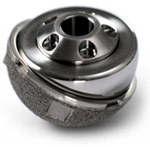Biomet M2a Magnum Hip Implant
 In October 2012, the Federal Judicial Panel on Multidistrict Litigation ordered that all Biomet M2a Magnum Hip implant cases be coordinated in the US District Court for the Northern District of Indiana. The Biomet M2a Magnum Hip Implant is a metal-on-metal hip implant. Patients with this implant have suffered injuries as a result of metal particles being shed from the device and resulting in serious personal injuries. In January 2014, Biomet agreed to settle hundreds of pending lawsuits involving the M2a Magnum.
In October 2012, the Federal Judicial Panel on Multidistrict Litigation ordered that all Biomet M2a Magnum Hip implant cases be coordinated in the US District Court for the Northern District of Indiana. The Biomet M2a Magnum Hip Implant is a metal-on-metal hip implant. Patients with this implant have suffered injuries as a result of metal particles being shed from the device and resulting in serious personal injuries. In January 2014, Biomet agreed to settle hundreds of pending lawsuits involving the M2a Magnum.
As the problems with metal on metal hip implants become more widely recognized, patients and doctors are starting to question the lack of testing and regulatory oversight surrounding the medical device industry. Most medical devices are approved by the FDA and sold to patients despite having undergone little or no testing to determine if the devices are safe, or if they even work. The inevitable result of such an abject failure on the part of the FDA and the manufacturers themselves is becoming increasingly clear. Devices that are not safe are nevertheless being sold and implanted into unsuspecting patients, who are in effect being used as guinea pigs by the medical device industry.
Currently, more than 6% of metal on metal hip implant patients need revisions to their replacements in less than five years, and that number is expected to increase drastically in the near future. (http://www.startribune.com/lifestyle/health/160249295.html). Patients are having to undergo complicated and dangerous revision surgeries in less than five years when the replacements should be lasting ten to fifteen years. Patients are forced to suffer through constant pain, swelling, limitation on their range of motion, and eventually premature device failure and surgical intervention. In the past decade alone, the FDA has received over 16,800 complaints regarding metal on metal hip implants. (http://www.bloomberg.com/news/2012-06-21/hip-implant-concerns-reached-16-800-in-a-decade-fda-says.html)
Manufacturer’s such as Johnson & Johnson, Zimmer Orthopedics, Biomet Orthopedics, Wright Medical Technologies, and Depuy Orthopedics conduct little or no testing and provide little, if any information on the long term effects of their products. Had the Manufacturer’s performed adequate testing prior to marketing these metal on metal hip implants, they would have discovered that the articulating surfaces of these devices create a large amount of volumetric wear debris in the form of Cobalt and Chromium ions. These heavy metals can cause tremendous problems at the hip (metallosis), can permeate the bloodstream, causing serious injuries throughout the body (arthroprosthetic colbaltism). The increased level of cobalt and chromium varies from patient to patient, yet currently patients are not required to have testing done to determine if they are being adversely affected by these defective hip implants. (http://www.medpagetoday.com/Orthopedics/Orthopedics/33397.
The FDA’s 510(k) medical device approval program gives approval to a product if it is found to be “substantially equivalent” to a product already on the market. Clinical testing is not required by the FDA for a 510(k) approval, which results in defective products being implanted into innocent patients. The FDA’s total lack of oversight is alarming and must be addressed as people are severely affected, and their lives forever altered as a result of these defective implants.
If you or a loved one has a metal-on-metal hip implant and is experiencing pain, swelling and/or redness, clicking, limited range of motion, or has experienced device failure and revision, please contact our office immediately.
Keefe Law Firm, LLC, handles complex medical device implant litigation throughout the nation. Our offices are headquartered in New Jersey.